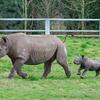The Research Committee had a fun-packed and science-filled 21st Research Conference held at Welsh Mountain Zoo in Colwyn Bay. The RC is keen to advance and develop links between scientists and practitioners (keepers, care-givers, those are directly looking after zoo animals and influence their care). With this in mind, we have tailored activities at the RC and beyond to bring zoo science firmly to the doorstep of care-givers- to make science and research output more accessible.
During the 20th anniversary Research Conference, we trialled a panel discussion of senior zoo researchers to answer questions relating to the field to be more open and accessible to those we are trying to reach. Considering the challenges facing zoo research (with the complexity of questions we are being asked to answer) the more input from all areas of of the zoo community is required to meet these challenges. To build on this for the 21st conference, the panel discussion comprised younger (in years on the RC and in years as a zoo researcher) members as well as more experienced researchers to share knowledge and advice on how to do zoo science, how to become a zoo researcher and what skills and attributes make a “good zoo scientist”. We also discussed ways of furthering the publication and dissemination of research, so that more papers get published in wide range of scientific journals so increase readership and impact. Having the editor of JZAR (the open access EAZA-sponsored journal) and a section editor of Animal Welfare on the panel was a great insight into the “life of a paper” to provide clarity and direction on what sorts of topics and subject areas make for a good academic publication (from a zoo research question).
Tours around Welsh Mountain Zoo provided delegates with first-hand experiences of evidence-based husbandry practices. The Zoo provided a demonstration of sea lion care, showing delegates how a training session allows animals the chance to participate in their own daily husbandry routine. This involvement in animal care routines is an excellent way of providing zoo animals with control and choice over their situation- two descriptors that are well understood as being key to promoting a positive quality of life for captive wild animals.
Increasing the output of science involving our zoo animals is brilliant. Bringing it to zoo keepers is something else close to our hearts. Over the past year, we have teamed up with UK’s zoo keeper membership organisation, ABWAK, to write a feature article for each new edition of their quarterly magazine. This “zoo science for keepers” has been really well received and provides a synopsis of two current pieces of published research, presented in an applied manner. To showcase the relevance of scientific output to advancing, and providing evidence for, zoo animal management. So far articles have covered “traditional” zoo species (giraffes, elephants, big cats) to those less studied… reptiles, amphibians and fish. We’re hoping to be able to review an invertebrate paper in a future edition too! A range of RC members have been involved in writing these short articles, and we’re hoping to continue this initiative for as long as ABWAK want us to write for them!
Related Members
-
NewsBIAZA calls for native species projects for Great British Wildlife Restoration 26th July, 2024The Great British Wildlife Restoration Awards by the British and Irish Association of Zoos and Aquariums (BIAZA) is looking for Britain’s best zoo/aquarium…
-
News
 Rhino Conservation Success at Yorkshire Wildlife Park Resort 23rd July, 2024The birth of a rare Eastern Black Rhino at Yorkshire Wildlife Park has become the catalyst for a fund-raising campaign to help save the endangered species.…
Rhino Conservation Success at Yorkshire Wildlife Park Resort 23rd July, 2024The birth of a rare Eastern Black Rhino at Yorkshire Wildlife Park has become the catalyst for a fund-raising campaign to help save the endangered species.… -
News
 New Changing Places Facility Installed at Thrigby Hall Wildlife Gardens 19th July, 2024New Changing Places Facility Installed at Thrigby Hall Wildlife Gardens Thrigby Hall Wildlife Gardens are thrilled to announce the opening…
New Changing Places Facility Installed at Thrigby Hall Wildlife Gardens 19th July, 2024New Changing Places Facility Installed at Thrigby Hall Wildlife Gardens Thrigby Hall Wildlife Gardens are thrilled to announce the opening…


